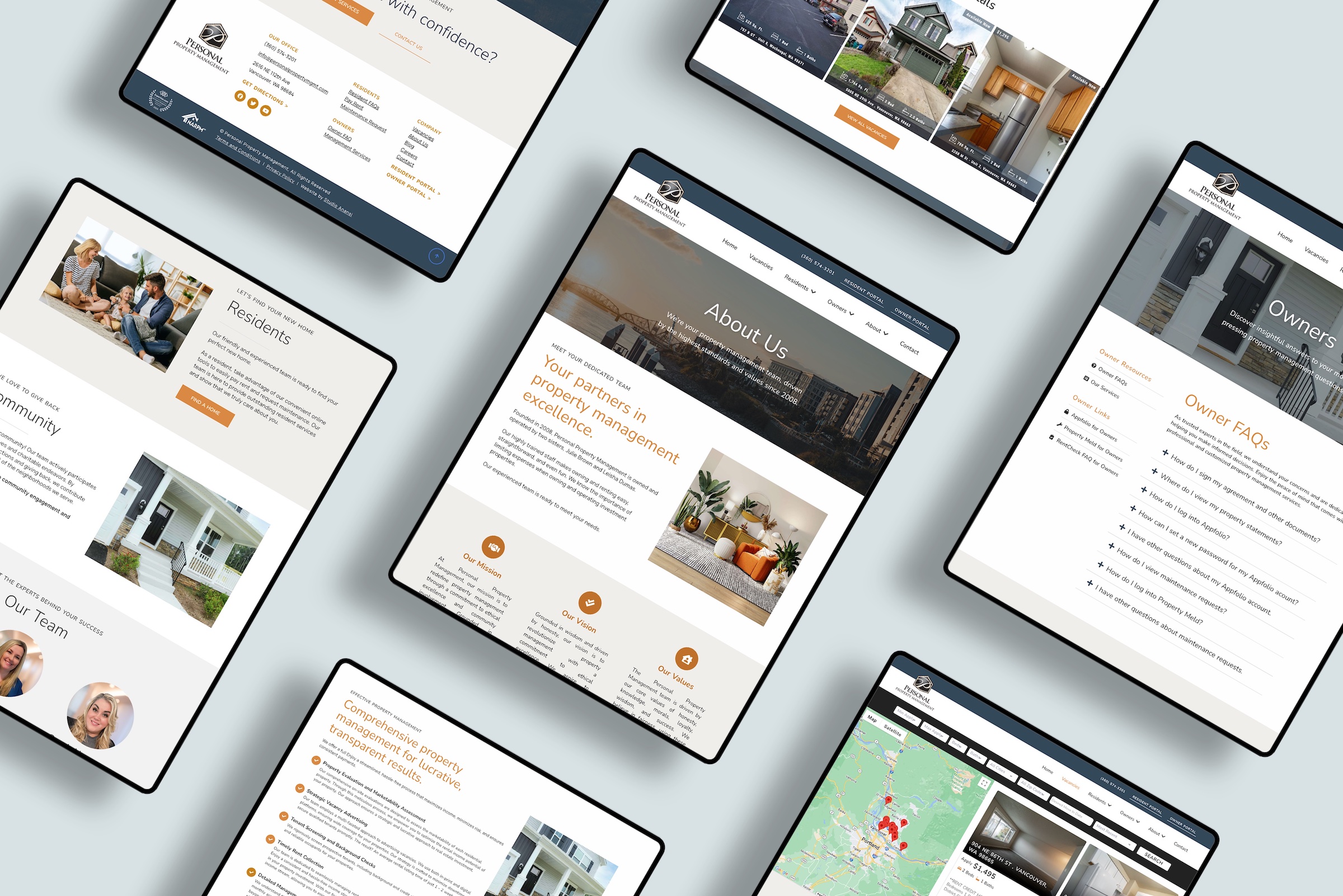So you’re ready to launch your small business website — great!
Every business website will need certain technical components, such as hosting, a domain, and a SSL certificate.
I’ll cover those technical components in another article; sign up here to be sure you’re notified when it’s available!
Today, I’m focusing on the less technical, yet still crucial, components of a small business website.
These needs also apply to websites for nonprofits, bloggers, artists, and more. Whatever the category, your website should have these 5 things to set you up for success.
1. A Clear Objective
What is the point of your website?
I want you to get specific — like, really specific. Take out a piece of paper and write down the #1, top priority of your website.
For a lot of people, their first answer is vague.
“My website will help me make money!”
Yes, most websites are meant to make money in some way:
- Selling products
- Marketing services
- Building a client base
But you need you move beyond the vague. Be super clear about your website objective — and note that I said “objective,” not “objectives.”
Yes, you can only have ONE.
Maybe you have a service and a killer strategy to close deals. You know that if you can just talk to a potential client, you’ll be able to explain your service and how it’s perfect for their needs.
In that case, your website’s primary objective could be to get people to schedule a call with you. Your calendar and an easy scheduling process should be all over the site, not buried deep on a “Contact” page somewhere.
Or maybe your objective is to build an email signup list. The signup form should be clear, simple, and visible on every page — and maybe even in a pop up!
(Yeah, website popups can be annoying. But they also work. If you’re worried about annoying visitors, set the popup to show to visitors just once in awhile.)
For both these examples, your objective is specific — not just a vague “Well my website should be making me money, somehow…”
Without a measurable objective, you’re just guessing what works.
With a measurable objective, you can test and optimize your website for improved results.
2. A Target Audience
Who are you trying to reach with your website?
Some people think that their audience is everybody. “Anybody will like my product! The whole world should want to buy it!”
Remember the importance of finding your niche, and hone in on specifics.
I mean, really specific specifics.
If your marketing is meant to appeal to everybody, it will really appeal to nobody. Sure, you may get a few customers — but at the expense of wasted time and resources.
Rather than casting a wide net and hoping to get a few customers, cast a very specific net and ensure that you find exactly the customers you’re aiming for.
By defining your target audience, you can help create better content that clearly benefits your website visitors. Think about demographics (such as age, location, and gender) and psychographics (such as attitudes, values and preferences).
Ask yourself:
- Who is my best customer?
- What are they concerned about?
- What problem do I solve for them?
- Why do they care about this problem?
- How do they see my business?
With answers to those questions, you can focus your website content from generic copy to targeted messaging that appeals to your ideal customer.
3. An Email Signup List
Email is alive and thriving.
I repeat, email is alive and thriving!
91 percent of Americans want to receive promotional emails from companies. What’s more, email is nearly 40 times more effective than social media to acquire new customers.
Yes — 40x.
You may spend months or even years cultivating a fantastic social media following — only to see your advertising costs skyrocket when Facebook, Instagram, and Twitter change their algorithms or raise ad rates.
As social media platforms change the rules of the game, email becomes even more important. Here are some of the many reasons I continue to advocate for email lists:
- Email allows you to be in direct, immediate contact with potential customers
- You own your email list; it won’t vanish if a platform loses traffic or your account is compromised
- Emails build trust and allow you to show your personality
- Regular emails keep you front-of-mind for potential customers
- You can nurture relationships with customers with personalized emails based on their interests
Don’t let yourself be limited by ideas of who “should” have an email list.
Anybody can and should have an email list. Gardeners, lawyers, librarians, musicians, coaches, dog walkers — you name it, that business will benefit from an email list.
Let’s take an example to see how collecting emails can help a professional that traditionally does not use email lists, such as plumbers.
Imagine you have to call a plumber. For many people, you do a quick search online for a local plumber, or reach out to friends for a recommendation in the area. The plumber comes, she fixes the issue, leaves, and that’s it.
Now imagine that twice a year, you get a short email update from this plumber — nothing overtly sales-y, just a quick email with a short hello message and “Top 5 Plumbing Tips for Winter” (or whatever).
Suddenly your plumber isn’t just “that person I had to call when things were stressful.” Instead, your plumber is “Jennifer who has two kids, cares about local schools, and reminded me to winterize my faucets.”
By creating a human connection, Jennifer stays on the radar of potential customers. They’re more likely to call her again and recommend her to friends and family. Plus, Jennifer can create repeat customers by advertising new services and specials.
Note: Email lists only work if you’ve made a good impression. Nobody wants to be reminded of a bad experience! But you don’t need to worry about that, right? You’re already in biz and doing great.
4. Photographs
Your website may be the best in the world, with perfect text and ideal messaging.
But your written content isn’t everything.
Remember the saying, a picture is worth a thousand words. This is especially true online — a website will be bo-o-o-o-ring without media content.
Photographs and videos add flair, and they can set the tone of a whole site. Of course, there are the usual photos:
- Before and after photos of your services
- Images of your storefront or physical location
- Pictures of happy customers (hopefully accompanying glowing testimonials)
Sometimes businesses don’t have photos available. Maybe you’re just launching a new venture, or your storefront is still a work in progress.
Good news: you can find free photos for website use on many websites.
I personally recommend using Unsplash, Pexels, and Pixabay to start your search.
5. You — Yes, YOU
People connect with other people — not with impersonal design and generic content. If your website doesn’t have personality, it won’t stand out.
This doesn’t mean you have to post everything about your personal life on your website.
DON’T plaster your site with the personal details best left for social media (or not).
But DO let your personality show through.
I always recommend that clients include a photograph (a professional headshot if possible) and a least a couple sentences about their interests, background, and life. You don’t need to write an autobiography — but share enough that people can get a feel for you.
…
There you have it, 5 essential components for a small business website! I hope these helped you prepare a new website, or inspired updates for your current site.






